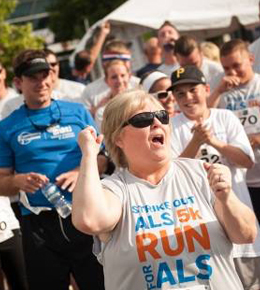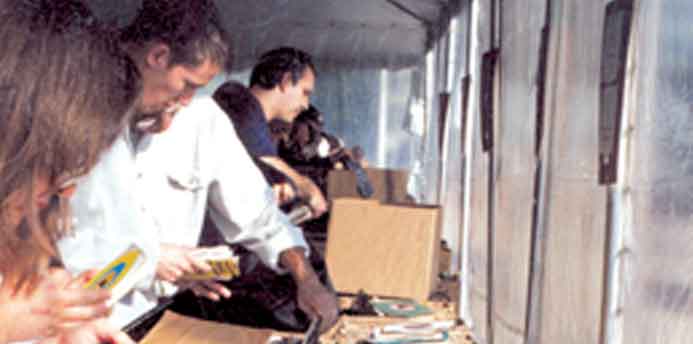Each fall for 25 years, musical purists and collectors traipsed to the parking lot of Old Orchard Center, where a yellow tent promised rare finds in LPs, old 78s, 45s, 8-tracks and cassettes.
Until the age of compact discs (and, really, until digital formatting and MP3s achieved their grand takeover), the Mammoth Music Mart offered thousands of recordings, sheet music and musical instruments donated from throughout Chicagoland and sold for a mere dollar or two. The Mart, organized and carefully curated by the Les Turner ALS Foundation, its beneficiary, folded its tent in 2002, but it left an indelible mark on the Chicago fundraising community. At its heyday, Dick Clark of American Bandstand fame, impressed by the efforts to use music to raise money, served as the event’s honorary chairperson, and through the sale of used music, the organization raised hundreds of thousands of dollars.
Today, the idea of selling tangible media for any sort of profit seems unfathomable. But the great success of the Les Turner ALS Foundation, and similar mom and pop philanthropies, remains a bastion of hope that a passionate few can make a difference.
Combining Passion with Contribution
In 1976, Glenview businessman Les Turner was diagnosed with ALS (Amyotrophic Lateral Sclerosis), better known as Lou Gehrig’s Disease. The 36-year-old father of three was a bit of an anomaly in contemporary North Shore society. He succumbed to the disease at the age of 38.
“Everybody panicked because nobody had ever heard of the disease, except Lou Gehrig,” says Wendy Abrams, Les Turner ALS Foundation Executive Director. Family and friends gathered and decided to start a foundation in Turner’s name to raise money for ALS research.
The Mammoth Music Mart remained part of Turner’s own legacy. After his diagnosis, Turner, confined to a wheelchair, watched a group of kids take his discarded records. He was inspired by their happiness, seeing the powerful effect of music. The fundraiser was, in its time, the largest record fair in the nation.
“It started with the passion to try to find a way to stop this terrible disease. Once anyone has experienced the ALS journey, they want to do anything and everything they can to prevent anyone else they love from getting it.”
ALS is a devastating disease, affecting two out of every 100,000 people in the United States. Generally, the progressive neurodegenerative disease begins with a general limb weakness, with an innocuous and often almost imperceptible change in precision or coordination. Typically, ALS affects motor neurons in the brain and in the spinal cord, but ALS strikes individuals in different ways. There is no specific test used to diagnose it, but it progresses rapidly, costing most patients speech and limb function. Fifty percent of those affected pass away within five years of diagnosis.
“Generally, their mind and their eyes aren’t affected,” Abrams says. “They’re very aware of what is going on, but they can’t stop it.”
 Les Turner ALS Foundation is committed to funding research to find a cure for the disease. From its small, familial roots grew a mighty organization, forging a partnership with Northwestern University’s Feinberg School of Medicine in its infancy. Today, the research center and clinic at Lois Insolia ALS Center at Feinberg, partnered with support groups, at-home nursing services and grants, serves 400 patients annually, caring for 90 percent of Chicago’s ALS population. The ALS Walk for Life, held at Soldier Field and drawing more than 6,000 people annually, is now its largest fundraiser.
Les Turner ALS Foundation is committed to funding research to find a cure for the disease. From its small, familial roots grew a mighty organization, forging a partnership with Northwestern University’s Feinberg School of Medicine in its infancy. Today, the research center and clinic at Lois Insolia ALS Center at Feinberg, partnered with support groups, at-home nursing services and grants, serves 400 patients annually, caring for 90 percent of Chicago’s ALS population. The ALS Walk for Life, held at Soldier Field and drawing more than 6,000 people annually, is now its largest fundraiser.
“Now, all these years later, the clinic at Northwestern is really a model for all ALS multidisciplinary centers. We’re looking to the future with great confidence,” says Abrams. “I’d like to see us funding research that’s going to make a huge difference in the lives of people with ALS. If we can raise more funds to serve more patients and increase the money we spend on research, we’ll see some really meaningful breakthroughs.”

